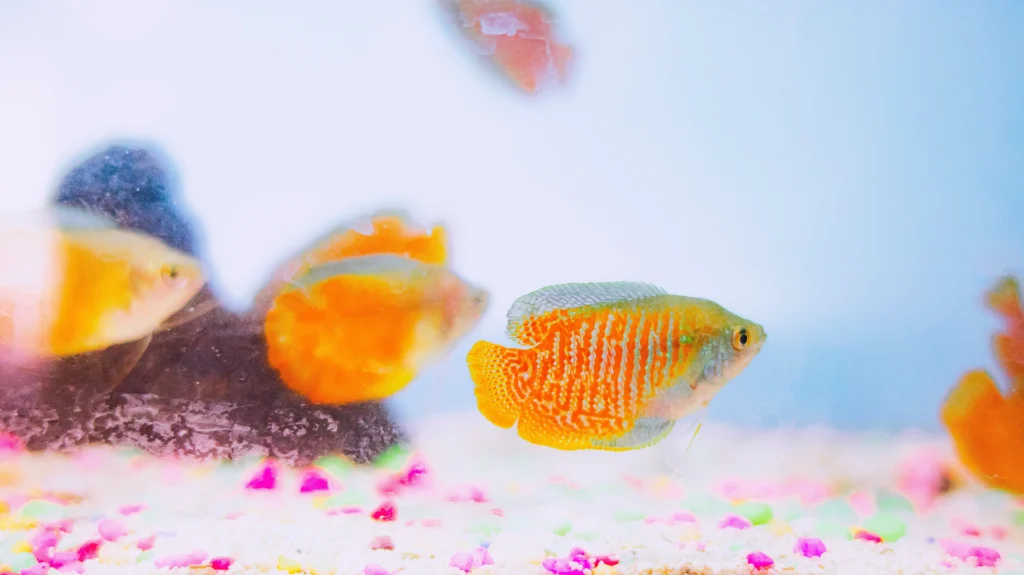A Guide to Aquarium Substrate
Having the right aquarium substrate is crucial for creating a thriving aquatic environment. In this comprehensive guide, we will explore different types of aquarium substrates, their benefits, and how to prevent compaction. By understanding these key factors, you can ensure a healthy and visually appealing ecosystem for your underwater pets.
Types of Aquarium Substrate
Gravel Substrate: Gravel is a popular choice due to its aesthetic versatility and stability. It provides a surface for beneficial bacteria and prevents erosion. Choose gravel size based on your fish’s needs.
Sand Substrate: Sand offers a natural look and is great for bottom-dwelling species and burrowing fish. Consider high-quality aquarium sand to prevent compaction over time.
Plant-specific Substrate: For vibrant aquatic plants use substrates enriched with essential nutrients like iron and potassium. These substrates enable healthy root development and support plant growth.
Clay-based Substrate: Clay-based substrates like laterite provide essential nutrients and minerals for aquatic plants. When combined with a cap of gravel or sand, they create an ideal environment for plant growth.
Crushed Coral Substrate: Ideal for fish species preferring higher pH and alkaline water conditions. Crushed coral functions as a buffering agent, maintaining stable pH levels. Ensure suitability for fish species before use.
Beneficial Bacterial Additives: These additives help promote biological filtration and support a healthy ecosystem in the substrate. Consider incorporating them to maintain water quality.
How to Prevent Aquarium Substrate Compaction
Preventing substrate compaction is vital for maintaining a healthy aquatic environment. Follow these steps to ensure your substrate remains loose and beneficial:
Choose the Right Substrate: Select a substrate that has the appropriate particle size and structure. Avoid fine sand or overly compactable substrates that can hinder water circulation and root growth.
Layering Technique: Use a layering technique when setting up your aquarium. Place a nutrient-rich layer of plant-specific substrate or clay-based substrate under a cap of gravel or sand. This prevents the substrate from compacting too tightly.
Aerate the Substrate: Regularly aerate the substrate by gently poking it with a substrate cleaner or your fingers. This process helps loosen the substrate, allowing for water circulation and preventing compaction.
Avoid Overstocking: Overstocking your aquarium can contribute to substrate compaction as fish constantly disturb the substrate. Keep a reasonable number of fish in your tank to minimize disturbance and compaction.
Regular Maintenance: Perform routine maintenance by gently stirring the top layer of the substrate during water changes. This prevents debris buildup and allows for better water flow.
Consider Bottom Feeders: Incorporate bottom-dwelling fish or invertebrates into your aquarium ecosystem. These species naturally help prevent substrate compaction by stirring and aerating the substrate while they forage.
Conclusion
Monitor Water Parameters: Regularly test and maintain proper water parameters for your specific fish and plant species. Maintaining optimal conditions reduces stress on organisms and supports a healthy substrate ecosystem.
By following these guidelines, you can ensure a loose and nutrient-rich substrate, promoting a flourishing aquatic environment in your aquarium.
Incorporating high-quality aquarium substrate and implementing preventative measures against compaction will significantly enhance your underwater paradise. Consider the needs of your fish, plants, and invertebrates when selecting a substrate to create a visually stunning and thriving aquatic ecosystem. By striking the right balance, your aquarium will become a haven where life thrives and flourishes in perfect harmony.
To know more visit:https://smartplantedaquarium.

